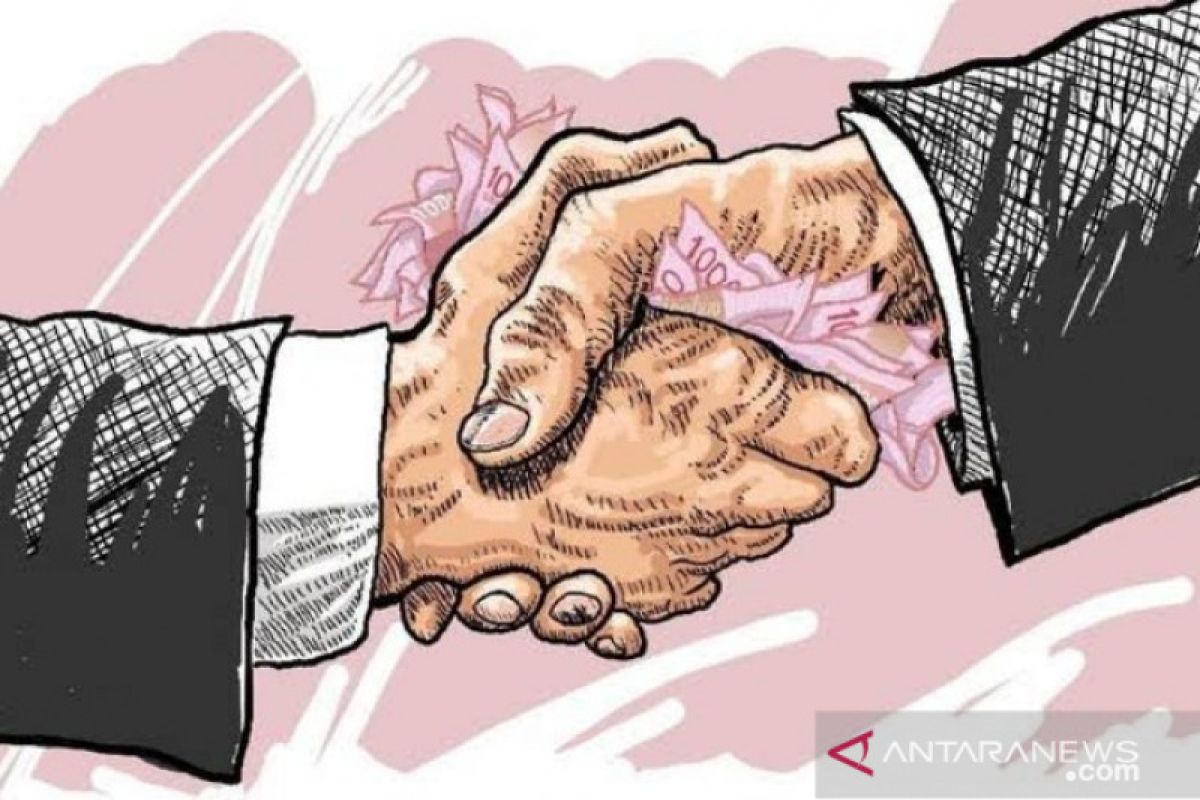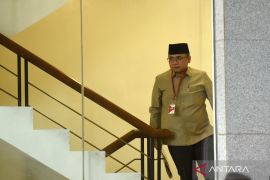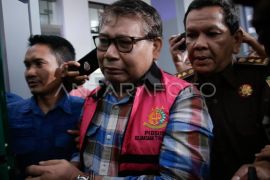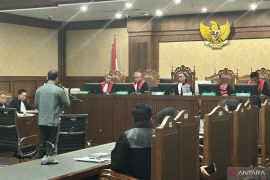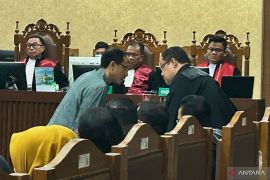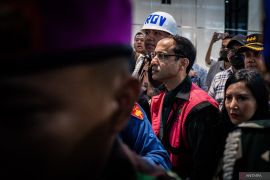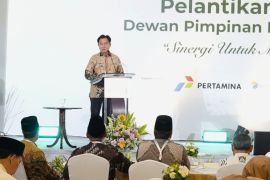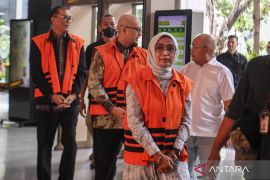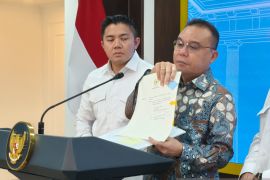Indonesia's CPI slipped three points, from 40 in 2019 to 37 in 2020, within the scale of 0 to 100, wherein 0 equates to extremely corrupt and 100 for extremely clean.
The drop in the CPI score subsequently led to Indonesia's free fall from the 85th to 102nd position in the rank, out of the total of 180 countries included in the survey.
The word “corruption” has perhaps become all too familiar, even jaded, among most Indonesians. Even at home, all information on corruption continues to be observed through television, radio, and also gadgets.
With the perpetual emergence of corruption cases in Indonesia, dating back to the colonial era to the Old Order and New Order eras until today, does it mean that the issue is exclusively in the hands of the Corruption Eradication Commission (KPK) and lawmakers in the executive, judiciary, and legislative levels?
The decreasing CPI announced by the TII can serve as a reminder to every party to bring about improvements based on strong commitments to improve the nation's future.
Movements to eradicate corruption should continue to be echoed and internalized, not only in certain executive levels but also among civil elements, down to the level of families.
As the smallest social institution, families are not mere spectators in the series of corruption cases, but rather, they play a significant role as the vanguards in anti-corruption movements.
This small-scale institution will determine the character of every Indonesian in future, whether they will uphold the values of anti-corruption as a generation of integrity or be the other way around.
Generation of anti-corruption
A researcher from Gadjah Mada University's Anti-corruption Research Center, Zaenur Rahman, stated that families play a role in creating a generation, with integrity, that upholds the value of intolerance towards corruption.
Rahman expressed belief that the exemplary behavior of parents in the family is the key to raising such a generation. This approach of edification will help the values to be deeply ingrained in the hearts of kids rather than leading by words or advice.
The level of integrity should be set, starting from the parents, for instance, when they emphasize on always telling the truth, refraining from lies, and speaking in an honest and open manner.
The habit of lying to divert children's attention is an example of a behavior that is considered detrimental but is often overlooked. Despite it not bearing no ill-will, such behavior can send across a message to the kids as the green signals for lying.
Rahman emphasized that the three key values of honesty, diligence, and responsibility are imperative to be taught to kids since an early age in order to shape them into becoming individuals with character and integrity.
Honesty is the main foundation of people's character traits, whilst diligence will nurture their perseverance and motivate them to steer clear from desiring to achieve results instantly, as corrupt individuals often seek to achieve prompt results without hard work.
Meanwhile, the value of responsibility should be engrained in the minds and hearts of children since corrupt individuals often disregard their professional duties and will not hesitate to claim what is not theirs. Furthermore, religious institutions followed by families play a significant role in forming a society that stands against corruption. Through constructive arguments, religious leaders are able to provide benchmarks for their congregation to not fall into the trap of corrupt behavior.
The efforts to prevent further proliferation of corrupt behavior will be hindered if religious leaders fail to show exemplary stance in rejecting various types of bribes, money politics, or other forms of corruption.
Educational institutions, both formal and informal, are the third institution that play a role in building an anti-corruption generation.
According to Zaenur, taking a cue from the practices followed in Japan, early childhood education only focuses on practicing noble approaches, such as being responsible and remorseful whilst also being willing to apologize and bear the consequences of doing wrong to others.
Hence, it is viewed as being rather disadvantageous that early childhood education currently focuses on cognitive aspects, such as the ability to count and read, which is actually not the time.
Public Control
After the formation of an anti-corruption generation, efforts to eradicate corruption can then be initiated by nurturing public awareness toward their rights that are violated by corrupt individuals.
Once such awareness is cultivated, community members are expected to fight for their rights by monitoring the utilization of budgets and the manner in which power is exercised.
The community also has room to control criminal acts of corruption by searching for, obtaining, and providing data or information on corruption. They also have the right to convey suggestions and opinions responsibly on the prevention and eradication of corruption.
Moreover, the public can monitor budget utilization through digital means. As a form of transparency, the government has provided an e-budgeting platform that aims to control and keep an eye on possible budget fraud.
The public's right to control is stipulated in Law Number 31 of 1999 on Eradication of Corruption Crimes as added and amended by Law Number 20 of 2001.
With strong public oversight, the room for corruption will become narrower, so corrupt individuals would think again before committing any criminal act.
In order to strengthen control, the community must remain committed and refrain from being part of corruption, including by not participating in offering bribes to state officials, including to traffic officers, in order to get out of a fine.
This includes being brave and willing to firmly reject money politics. The problem is that money politics is what in turn creates high political costs, which in turn will bring back corruption.
Supported by Systems
Rimawan Pradiptyo, a Gadjah Mada University lecturer, who actively partakes in the anti-corruption movement, believed that morals alone cannot break the vicious cycle of corruption without being supported by a streamlining of systems.
Pradiptyo believed that eradicating corruption in the country is an arduous challenge, as several systems still have loopholes for the criminal act to be committed. For instance, a complex public service system that has resulted in bribery, including in the procurement of goods and services and licensing.
In responding to this possibility, public service agencies have now begun to adapt to totally online services, ranging from administrative services to licensing.
The government has taken the initiative to launch digitalization in various public services, such as e-ticketing, e-smart, e-Samsat, e-budgeting, and e-planning.
Furthermore, several laws, as the pillars of the system in this country, need to be improved. The one on Corruption Act, for instance, should be revised since it is out of date.
As one of the nations that have signed the UN Convention on Anti-Corruption (UNCAC), Indonesia should immediately ratify the contents of the convention in the Corruption Act.
Regulations must also be strengthened rather than weakening the space for anti-graft bodies to move.
Researcher Zainal Arifin Mochtar has also confirmed that future corruption cases will continue to emerge without serious efforts from all parties, especially state officials, from president, ministers, to the House of Representatives, to jointly improve the system.
Hence, in order to achieve effective corruption prevention steps, the moral development of a nation that is anti-corruption in its approach must be sustainable and go hand-in-hand with a system that is responsive to corruption eradication.
In order to put an end to the story of corruption in this beloved country of ours, the corruption eradication movement must become a common awareness, starting from state officials to every strata of society.
A shared awareness is deemed necessary since all Indonesian citizens, without exception, are bound by a social contract that is contained in the fourth paragraph of the opening of the 1945 Constitution, which is to educate the nation.
The movement should be conducted with a spirit of optimism rather than pessimism. When there are voices saying that corruption in Indonesia has reached a saturation point, then what are we going to do about it?
Certainly, staying still is not an option. A strong will is needed to make a contribution to the nation regardless of the risks.
Related news: BMKG employee summoned over alleged graft case at sugar mill
Related news: Corruption threatening pandemic handling efforts: Finance Minister
Editor: Rahmad Nasution
Copyright © ANTARA 2021
